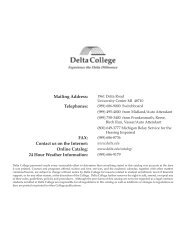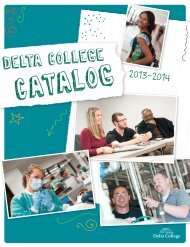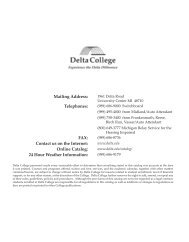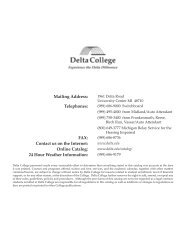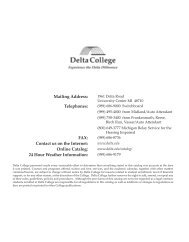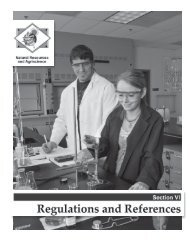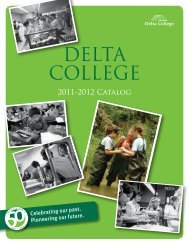2012 - 2013 catalog - Delta College
2012 - 2013 catalog - Delta College
2012 - 2013 catalog - Delta College
Create successful ePaper yourself
Turn your PDF publications into a flip-book with our unique Google optimized e-Paper software.
COM 114W Interpersonal Communication 3 Sem Hrs<br />
Prerequisites: READING LEVEL 2 or WRITING LEVEL 2. Introduces<br />
the processes of perception, non-verbal behavior, self- concept, roles,<br />
and culture on human interaction in varying social settings. Increases<br />
student competency as communicators in social settings. Applies various<br />
concepts of communication behavior in the classroom. Credit may earned<br />
in any SPH 114 course or any COM 114 course, but not in both. (45-0)<br />
COM 202W Oral Communication for Managers 3 Sem Hrs<br />
Prerequisites: READING LEVEL 2 and WRITING LEVEL 2. Focuses on<br />
organizational behavior; management behavior styles and team building;<br />
interpersonal communication; appraisal, disciplinary, motivational and<br />
counseling interviews; listening and nonverbal behavior; public speaking;<br />
and leadership and consensus decision making. Emphasizes practical<br />
skills within the organization. (45-0)<br />
COM 212W Listening 3 Sem Hrs<br />
Prerequisites: READING LEVEL 2 and WRITING LEVEL 2. Focuses on<br />
the theory, behavior, and skills of listening. Includes discussion of the key<br />
components of listening such as hearing, understanding, remembering,<br />
interpreting, evaluating, and responding. (45-0)<br />
COM 214W Small Group Communication 3 Sem Hrs<br />
Prerequisite: READING LEVEL 2 and WRITING LEVEL 2 and a previous<br />
communication course. Focuses on small group communication theories,<br />
strategies, and skills for successful group participation. Increases student<br />
competency as effective team members and leaders. (45-0)<br />
COM 215W Introduction to Theatre 3 Sem Hrs<br />
Prerequisites: READING LEVEL 2 or WRITING LEVEL 2. Offers<br />
insight into all the various aspects of theatrical production. Observes<br />
and critiques dramatic productions whether on stage, film, or the T.V.<br />
screen. Analyzes plays and experiences in acting, directing, scenery,<br />
and lighting. (45-0)<br />
COM 216W Theatre History 3 Sem Hrs<br />
Prerequisites: READING LEVEL 2 and WRITING LEVEL 2. Introduces<br />
the student to the various historical areas of the theatre, from the ancient<br />
Greeks to the present. Emphasizes the development of the physical<br />
theatre, representative playwrights, and the development of actor and<br />
the director. (45-0)<br />
COM 222 Introduction to Acting 3 Sem Hrs<br />
Prerequisites: READING LEVEL 2 or WRITING LEVEL 2. Introduces<br />
the fundamentals of stage terminology, stage movement, use of voice,<br />
and believable character creation for an audience in both improvisational<br />
and written scenes. Emphasizes preparation and presentation of scenes<br />
before a classroom audience. (45-0)<br />
COM 224W Nonverbal Communication 3 Sem Hrs<br />
Prerequisites: READING LEVEL 2 and WRITING LEVEL 2. Focuses<br />
on nonverbal communication as it relates to interpersonal social,<br />
business and professional behavior. Analyzes kinesics, facial affect,<br />
eye contact, body movement and posture, physical characteristics,<br />
haptics, chronemics, proxemics, artifacts and environment. Discusses<br />
the prevalent theories underlying nonverbal behavior. (45-0)<br />
COM 235W Principles of Persuasion 3 Sem Hrs<br />
Prerequisites: READING LEVEL 2 and WRITING LEVEL 2, and COM<br />
112 or COM 114, or instructor permission. Introduces the study and<br />
practice of persuasion focusing on the dual roles as producers and<br />
consumers of persuasive messages; examines persuasion in a variety<br />
of contexts using both the rhetorical and behavioral science traditions;<br />
applies theory and research to practical situations; develops strategies<br />
for constructing effective and ethical persuasive messages. (45-0)<br />
COM 236W Advanced Oral Communication 3 Sem Hrs<br />
Prerequisite: READING LEVEL 3 AND WRITING LEVEL 3 AND “C” or<br />
better in COM 112W or COM 202W, or written permission of instructor.<br />
Develops an advanced understanding of theories and strategies in the<br />
delivery of oral presentations. Advanced speaking skills are developed<br />
from an historical and contemporary rhetorical context. Emphasis is<br />
on analyzing and practicing speech discourse conventions, along with<br />
advanced information literacy skills as a key to effective delivery of<br />
speeches. (45-0)<br />
COM 244W Family Communication 3 Sem Hrs<br />
Prerequisites: READING LEVEL 2 and WRITING LEVEL 2. Provides<br />
students with an understanding of interpersonal communication in the<br />
context of family systems. Studies family communication through the<br />
lens of family systems theory, rules, and interaction theory. Provides<br />
students the opportunity to apply and operationalize the theories<br />
through various assignments related to their family of origin, existing<br />
family, and family configurations in other cultures. (45-0)<br />
COM 245W Intercultural Communication 3 Sem Hrs<br />
Prerequisites: READING LEVEL 2 and WRITING LEVEL 2. Provides<br />
an analysis of issues associated with communicating with an emphasis<br />
on how communication is influenced by culture and how culture is<br />
influenced by communication. Utilizes concepts drawn from sociology,<br />
psychology, anthropology, and communication. Applies theories and<br />
research related to intercultural communication in order to increase<br />
understanding of the relationship between culture and communication<br />
and subsequently be able to communicate effectively with people of<br />
other cultural groups. (45-0)<br />
COM 290-299 Special Projects in Communication<br />
Chemical Process Industries<br />
CPI 110 Introduction To Chemical Process<br />
Industries<br />
2 Sem Hrs<br />
Concurrent enrollment in CPI 120 recommended. Provides overview of<br />
Chemical Process Industries and Chemical Technology with focus on<br />
the role of the process operator and the chemical technician. Introduces<br />
concepts of safety, regulation, laws affecting the job and the industry,<br />
and quality control. Includes study skills and attitudes necessary for<br />
study of science/technology as well as means of continuing professional<br />
and personal growth. Credit may be earned in CPI 110 or CT 100 but<br />
not both. (30-0)<br />
CPI 115 Chemical Plant Science Fundamentals 2 Sem Hrs<br />
Prerequisite: Instructor permission required to register. Requires that<br />
the student has already earned a technical associate, bachelor or greater<br />
degree; military experience; over 8000 hours industrial experience; or<br />
a journeyman’s card. Reviews the fundamental scientific principles of<br />
physics and chemistry. (30-0)<br />
CPI 120 Introduction To Process Operations 2 Sem Hrs<br />
Prerequisite: MATH LEVEL 5. Concurrent enrollment in CPI 110<br />
recommended. Provides an overview of process operations including<br />
analysis of process flow sheets. Details description and analysis of<br />
operations as they involve reactors, distillation columns, heat exchangers,<br />
and other types of operations in the typical chemical plant. (30-0)<br />
CPI 210 Basic Chemical and Unit Operations 4 Sem Hrs<br />
Prerequisite: Completion of PHY 101, PHY 111, or PHY 211 with a grade<br />
of “C” or better (A high school Physics course completed with a “C” or<br />
better within the last three years may also qualify.) and CPI 120 with a<br />
grade of “C” or better. Provides understanding of basic principles of<br />
process technology along with an introduction to the use and operations<br />
of standard process equipment used worldwide by process technicians.<br />
Includes principles of energy and heat, pressure, fluid flow, heat transfer<br />
as well as topics concerning quality control and unit operations. Provides<br />
operational experiences with valves, pumps, compressors, distillation<br />
towers, and other process equipment and instrumentation. (45-45)<br />
<strong>Delta</strong> <strong>College</strong> <strong>2012</strong>-<strong>2013</strong><br />
Prerequisite Levels - See charts in this section.<br />
357



